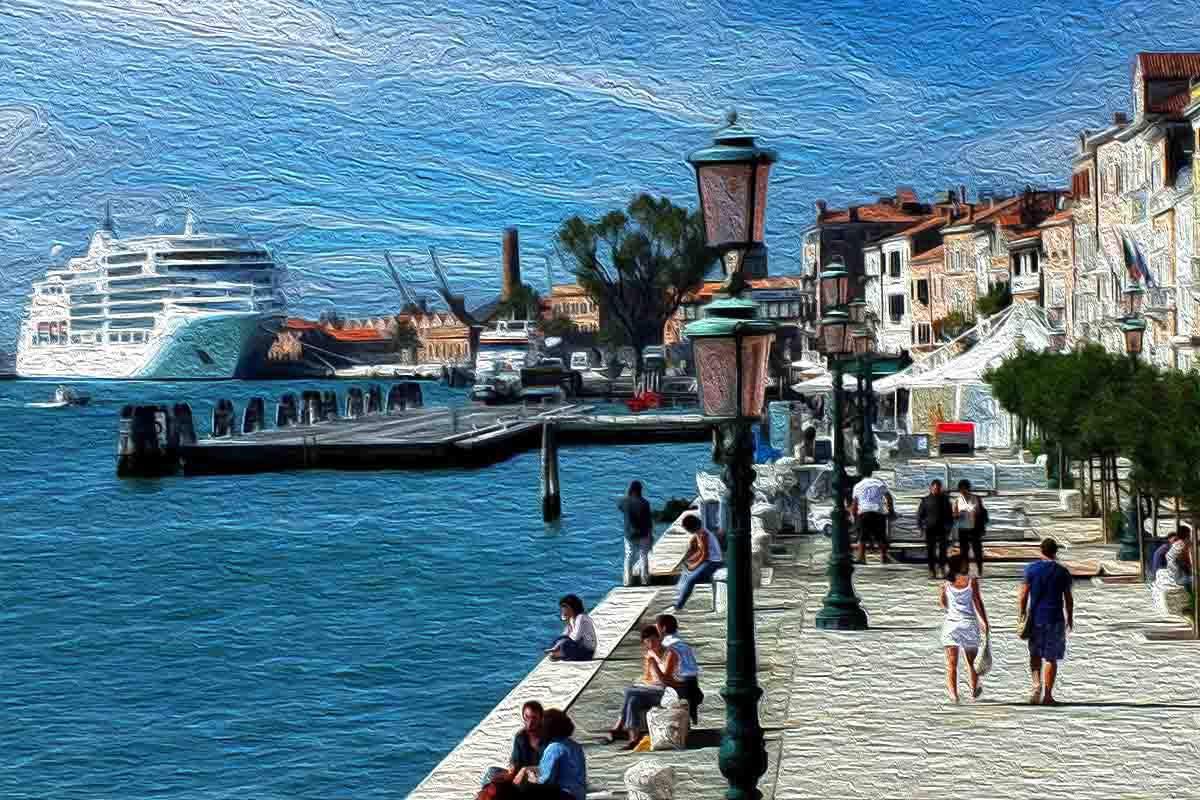Published: Updated:
Cruise ship passengers frequently contact Consumer Rescue after falling victim to scams during their travels. Unfortunately, by then it’s usually too late to do anything – except to tell their stories so others can avoid the same fate.
Here are the eight most common travel scams you should know before your next cruise.
1. Fake cruise line customer service (scam call centers)
The fake cruise line customer service scam hits passengers before the trip even begins.
For some time, bad actors have laid traps in Google’s search results and social media forums. There, they post incorrect contact information for the major cruise lines and airlines. When an unsuspecting cruiser dials into one of those call centers, they’re soon chatting with a scammer.
Related: Here’s how fake Carnival customer service is scamming cruisers
The phony customer service agent will alert their surprised victim that they have an outstanding balance. The scammer explains that hefty docking fees are required for their particular sailing and must be paid immediately. If the payment isn’t made, the cruise line will cancel the trip, according to the “agent.”
Many cruise passengers have been caught off guard by this scam and end up paying the fee, forgetting what they called about in the first place. Only after they’ve handed over their credit card information and other personal details does the traveler realize something is wrong.
Related: British Airways passengers beware: Scammers are targeting you
This scam has several versions, with some cruise passengers being told of the new docking fees while others receive offers of low-cost upgrades or other amenities. Some travelers have reported that the fake customer service agents have actually called them and that the person on the other end of the line seemed to have their cruise information already.
How to avoid this scam:
- Download your cruise line’s mobile app. You’ll never be redirected to a scam call center via your cruise line’s official app.
- Don’t post personal details about your cruise on social media. Those incoming scam calls are from con artists who have harvested passenger information from Facebook groups and other online forums. So be very careful about what you share online.

2. Scam electronic travel authorization (ETA) sites
In January 2025, the United Kingdom began requiring U.S. citizens to obtain an electronic travel authorization (ETA) prior to entry. Cruise passengers who sail to or from England can obtain that ETA through gov.UK for £16 (about $22).
Related: Going to England? Here’s how to get your UK ETA without getting scammed
However, scam websites immediately cropped up all over the internet posing as official issuers of UK ETAs. Many travelers learned too late that the ETA should only cost £16 – after paying hundreds of dollars to impostors. Even worse, some of the victims of this scam don’t even get an ETA in the end.
How to avoid this scam:
- Do your research: It’s crucial that you do your research long before you pack your bags and head to the airport for an international cruise. You must know what documents you need to board the ship and how (and where) to obtain them. The U.S. Department of State is a great place to start your research. On the State Department’s page for the United Kingdom, there is a link directly to the UK government website where you can acquire your ETA – no scams included.
- Slow down: Scammers depend on tricking you and sealing the deal before you catch on. Do not attempt to apply for your visa when you’re in a rush. Set aside time to carefully complete the process, making sure you are on an official government website.
3. Fake travel agent giving you a “good deal”
Yet another scam that happens before a cruise passenger ever sets foot on a ship involves fake travel agents. These bad actors prey on a traveler’s desire for a good deal.
Trolling through Facebook groups and other social media forums, scammers pose as fellow cruisers. They secretly direct message group members and engage in friendly interactions before sharing their true intentions. These fraudsters claim to be travel agents specializing in cruises with deals that sound too good to be true.
That’s because they are too good to be true. In order to access the special, the cruiser must pay with an instant cash transfer app like Zelle.
Never use Zelle to pay for your cruise
Fact: Consumers must remember that, unlike credit cards, Zelle and other cash apps like it provide zero purchase protection. Reputable travel agents never ask customers to pay for their cruise with a money transfer app. Those are meant to send cash to friends and family, not to pay for goods or services.
In one recent case, L. Williams discovered Carnival had placed her name on the Do Not Sail list after her strange experience with a fake travel agent. That person asked Williams to pay for her cruise aboard Carnival Freedom with Zelle. Against her better judgment, she sent the fraudster nearly $4,000 to book her family’s trip. He then provided Carnival with a credit card to confirm the cruise… a stolen credit card.
It turns out the man Williams says she knew only as John was not a travel agent. In reality, he was a criminal.
The actual owner of the credit card reported the cruise payment as fraudulent after the Williams family completed their cruise. Carnival wanted Williams to pay for the trip her family took, and from the cruise line’s point of view, she was the scammer. Williams got banned and was sent a bill for the unpaid balance.
She hoped I could negotiate her way off the Do Not Sail list and make the almost $4,000 bill disappear.
That wasn’t something I could do.
No way to fix this cruise scam
Williams had ignored many bright red flags about that “travel agent.” As a result, she put all her money and her reputation with the cruise line in jeopardy. Not only that, but her family did take the cruise, and someone needed to pay for it.
I gave Williams the bad news. There was no way that I could ask Carnival to forgive the debt. (Read the full story here: This ex-Carnival passenger lost $3,556 Zelle scam – and landed on the Do Not Sail list, too).
How to avoid this scam:
- Always use a credit card to pay for your cruise: Never pay for your cruise, excursions, or anything else with Zelle. These transactions have zero purchase protection if things go wrong, and are, by the way, the favorite payment method of scammers. The Fair Credit Billing Act only protects consumers who use credit cards to make purchases.
- Book your cruise directly or with a professional travel agent: Facebook groups and other social media forums aren’t where to find a reputable travel agent or cruise consultant. You can find an experienced travel advisor who won’t scam you and specializes in cruises through VeriVacation by the American Society of Travel Advisors (ASTA).
4. Free facials with cocktails – especially in the Bahamas
After I first reported the story of the Florida couple who said bad guys had drugged them in Nassau and forced them to purchase $10,000 in facial products, a surprising thing happened. Many other cruise passengers contacted me with similar stories.
They all described meeting a friendly lady on the street in Nassau who invited them into her shop for a free facial. Once inside, aggressive men slathered them with creams and served alcoholic beverages.
At the same time, the sales pitch for the skincare products was hard and filled with outlandish promises. Mariah Carey featured in most of these tales as a sponsor of the products.
“I feel these people drugged us,” said one cruise ship passenger. “They said the wand with the cream would cause me to grow hair again. Why would I have believed that? I’m fully bald.”
📬 Subscribe to:
Tales from Consumer Advocacy Land
Real stories. Real rescues. Real advice.
Join thousands of smart travelers and savvy consumers who already subscribe to Tales from Consumer Advocacy Land — the friendly weekly newsletter from Michelle Couch-Friedman, founder of Consumer Rescue. It's filled with helpful consumer guidance, insider tips, and links to all of our latest articles.

“I think they put some type of drug in the cream he put on my face,” said another cruiser. “They diagnosed my husband with skin cancer and told me they were keeping the truth from him. The $10,000 device they wanted me to buy could cure his cancer, though. I’m aware this sounds ridiculous now.”
“I felt threatened as soon as they sat me down and gave me a drink,” said one more cruise passenger. “I wanted to leave, but they said I needed to stay.”
All of the cruise ship passengers who have contacted me came home with jumbo credit card bills and a bunch of stuff they never wanted. Even worse, not one of them reported the suspected drugging to local authorities or to cruise line personnel.
Asking Consumer Affairs: Are cruisers being victimized?
I sent an inquiry to Consumer Affairs in the Bahamas to ask what might be happening in Nassau. After some time, their spokesperson responded and confirmed the complaints are being investigated.
Good day, Ms. Couch-Friedman,
Please accept our humble apologies for the delayed response and these unfortunate incidents, which in no way, shape, or form represent the Commonwealth of the Bahamas’ culture or values. This matter has been forwarded to the relevant authorities for thorough inspection.
Spokesperson of Consumer Affairs of the Bahamas
I’ve received no further update from Consumer Affairs. However, one more cruise passenger has reported a similar experience to me. That woman told me she knows of four other victims of the free facial scam in Nassau.
How to avoid this scam:
Decline free facials, drinks, or other items: The easiest way to avoid this scam is by rejecting free facials and alcoholic beverages offered by random people on the street during your travels. This isn’t a scam that is unique to cruise ship passengers. You could encounter it in cities all around the world – even in your local mall. The main goal is to sell you a plethora of expensive creams, devices, and services.
In general, this is just a harmless sales scheme that can lead tourists to buy things they don’t really need. However, in Nassau, there seems to be a darker spin on the operation. All of the cruise passengers who have contacted me after their experiences have reported feeling threatened, intimidated, and drugged. Based on those reports, which span cruisers from all the major lines, I would recommend staying out of beauty shops in the Bahamas.
Related: 2 more cruise ship passengers say they were scammed in Nassau, the Bahamas.

5. Third-party cruise excursions
Booking your cruise excursion through an independent company can be fine – if the business is reputable. Unfortunately, not all “excursion bookers” are created equal. Travelers should keep that in mind when planning their shore activities.
Last year, I began receiving many complaints about Sandra’s Cruise Tours owned by Sandra O’Leary, an unlicensed travel provider from Canada. Operating as a quasi-travel agent, she set up Facebook groups for various Carnival sailings and then advertised her guided shore excursions to members. Often, O’Leary was on those same cruises with her fellow Facebook group members.
This arrangement worked fine for her until she sold over 800 tickets at around $130 a pop to Carnival Legend passengers for an iceberg tour in Greenland. Because of bad weather, the ship never made it further than Canada, something O’Leary had never considered.
The passengers who purchased their Excursion tickets through Carnival received immediate refunds, but that wasn’t the case for everyone who booked with O’Leary. She quickly changed the refundable nature of those tickets on her website, and her customers were outraged.
Unfortunately, many had paid her using Zelle, so they had very little recourse. Others had used credit cards and filed disputes. But O’Leary fought all the chargebacks, providing copies of her newly updated terms of sale, falsely claiming the tickets were nonrefundable.
Some credit card companies quickly rejected her efforts and sided with their customers. But other passengers struggled to get their money back… and some never did.
However, the damage was done to O’Leary’s business and reputation. Ultimately, the negative publicity and ongoing complaints from those Carnival passengers forced O’Leary to close up shop, leaving many of her customers who had trusted her empty-handed.
How to avoid this scam:
- Book your cruise excursions through your cruise line: Remember, if you book an excursion through your cruise line and your ship deviates from its course, you’ll get an immediate refund. That isn’t the case if you use a fellow passenger you’ve met through a Facebook group to arrange your day trips from the ship.
- Use reputable excursion bookers like Viator: If you choose to make your own shore excursions, make certain you do so with a reputable company like Viator. Official companies have clear terms and conditions that won’t change after purchase.
- Never book a nonrefundable third-party cruise excursion: Remember, your cruise line doesn’t guarantee your itinerary. Cruise itineraries are always subject to change. So never book a nonrefundable third-party excursion.
- Always use a credit card: Paying with a credit card gives you the protection of the Fair Credit Billing Act — a powerful consumer resource. If a merchant charges you for something it doesn’t provide, a credit card dispute should provide relief.
6. Unmetered or broken-meter taxi
The broken-meter or unmetered taxi scam can hit not only your wallet, but also your safety. When a cruise ship sails into port, there are typically taxis waiting for passengers who wish to explore beyond the immediate area.
But some of the drivers of those vehicles have nefarious plans. Their goal is to trick travelers who aren’t familiar with the area into getting into their car. The destination the customer has in mind doesn’t matter. They’ll be going on a meandering trip that will end with a giant tab.
For the most part, this scam is conducted in unofficial taxis whose driver may or may not be licensed. There is often no meter at all in these vehicles or it may be broken – something the driver won’t reveal until after the passengers are already in the car.
Unofficial taxis should be avoided, not just because you could get bamboozled out of cash, but because getting into one is dangerous. Official taxi drivers are licensed and their car is regularly inspected. You can’t guarantee any of that with an unofficial taxi.
Related: 5 tourist scams that could ruin your vacation in 2026
How to avoid this scam:
- Only use official taxis at the destinations you’re visiting. If you’re in a cruise port and you’re unsure of what an official taxi looks like, stop by the tourist kiosk that is usually located near where you disembark from the ship.
- Make sure your driver turns the meter on when you get in.
- Familiarize yourself with where you’re going and about how much it should cost. Use Google Maps or similar apps to learn the most direct route and ask your driver if that is the way you’ll be going. Watch your real-time progress on your mobile device to ensure you stay on track. Your driver will be far less likely to try to take you for an expensive ride you don’t want if he knows you’re aware of your surroundings.
7. Surprise! You’re going to a travel club or timeshare presentation
Cruise passengers wandering around a port without plans may find themselves invited to a beautiful resort for free – food and drinks included.
Of course, there is a catch, but the true nature of the invitation will only become apparent later. After spending some time exploring the resort and enjoying maybe one too many tropical cocktails, the cruiser will find themselves in a high-pressure travel club or timeshare presentation.
Over the years, many travelers have contacted me after they’ve returned from vacation with a freshly signed contract for a timeshare they say they never wanted. But the tropical ambiance and alcoholic drinks lulled them into an altered state of mind. They pictured themselves coming back to that beautiful resort time and again, but back home they realized it was a poor decision.
Unfortunately, for these travelers, contracts signed abroad are legally binding. There is very little chance of canceling the agreement later. Buyer’s remorse is never a basis for breaking a contract.

How to avoid this tourist trap
This is more of a tourist trap than an outright scam. The travelers who accept a free resort pass will get free drinks and use of the facilities. The entire purpose is to show the property in its best light and then convince the traveler to buy into it. After the target is plied with alcohol and feels relaxed, the hard sell begins.
If you know that you’re not able to resist a sales presentation, decline any invitations to visit a nearby resort. It is always a travel club or timeshare scheme.
Related: Post-vacation regret: Here’s why you should never impulsively buy a travel club
8. Friendly stranger wants to take your photo
This scam begins with a friendly stranger offering to take a photo of you with your camera or phone. After you hand over your device, one of two things will happen depending on the level of deviousness of the fraudster.
The first possibility is that you’ll get your photo taken. Then the scammer will politely ask you to pay for his or her photography services. If you decline, the previously friendly con artist’s demeanor will significantly change. You won’t get your camera back until you pay up. Some cruise passengers have reported feeling threatened.
The more sinister version of this scam has the bad actor running off with your camera or phone the moment you hand it over. No photo included.
Another version of this scam involves a person who asks you to take his or her photo with their device. Again, if the person is a con artist, one of two things will happen next. As the scammer hands over his phone or camera, he will purposely drop it and claim you did it. He will then demand a settlement on the spot to pay for his now broken device. If you refuse, he’ll threaten to call the police.
The other possibility is that after you take a photo of the stranger, they will offer to take your picture with your phone. At this point, victims are sometimes lulled into a false sense of familiarity with their new acquaintance and agree, but the thief takes off with the camera as soon as it is in their hands.
How to avoid this scam
Don’t trust strangers with your devices: Handing over expensive equipment to a total stranger in a tourist area is never advisable. If you want someone to take a photo of you, it’s best to ask a fellow cruise passenger who is unlikely to ask for payment or steal your device. Unsolicited requests from unknown people to take your photo are nearly 100% of the time the beginning of a scam.
The bottom line
Cruise passengers, like other tourists, are often the target of bad actors. The best way to dodge them is to familiarize yourself with the latest scams and safety issues at all the destinations you’ll be visiting during your trip.
The State Department’s website is a great place to learn about the safety issues you should be aware of before disembarking anywhere during your cruise. Every country has a page there with a safety and security tab where you can read about current problems that travelers have experienced at your destination.
The more you know about the countries you’ll be visiting and the potential scams operating there, the less likely you’ll be to fall for one.
And remember, if the worst happens and you become a victim of a crime abroad, report it in real time to local authorities. That’s when there may still be a chance to do something about it. Unfortunately, after you’re home, it’s almost always too late. (Michelle Couch-Friedman, Founder of Consumer Rescue)
Watch out! Here are the top cruise mistakes cruisers make in 2026
__________
Have a problem with a company you can’t fix on your own? Use the button below to ask our team for help. Our mediation assistance is always fast, friendly, and, best of all, free of charge.




